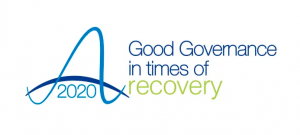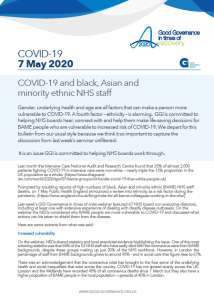COVID-19 and black, Asian and minority ethnic NHS staff
07 May 2020

Gender, underlying health and age are all factors that can make a person more vulnerable to COVID-19. A fourth factor – ethnicity – is alarming. GGI is committed to helping NHS boards hear, connect with and help them make life-saving decisions for BAME people who are vulnerable to increased risk of COVID-19.
We depart for this bulletin from our usual style because we think it so important to capture the discussion from last week’s seminar unfiltered.
It is an issue GGI is committed to helping NHS boards work through.
Last month the Intensive Care National Audit and Research Centre found that 35% of almost 2,000 patients fighting COVID-19 in intensive care were non-white – nearly triple the 13% proportion in the UK population as a whole. [https://www.theguardian.com/world/2020/apr/07/bame-groups-hit-harder-covid-19-than-white-people-uk]
Prompted by troubling reports of high numbers of black, Asian and minority ethnic (BAME) NHS staff deaths, on 1 May Public Health England announced a review into ethnicity as a risk factor during the pandemic. [https://www.england.nhs.uk/blog/note-for-all-bame-colleagues-working-in-the-nhs/]
Last week’s GGI Governance in times of crisis webinar featured 67 NHS board non-executive directors, including at least one with extensive experience of dealing with deadly disease outbreaks. On the webinar the NEDs considered why BAME people are more vulnerable to COVID-19 and discussed what actions can be taken to shield them from the disease.
Here are some extracts from what was said:
Increased vulnerability
On the webinar, NEDs shared statistics and local anecdotal evidence highlighting the issue. One of the most sobering statistics was that 68% of the 53 NHS staff who have sadly died with the coronavirus were from BAME backgrounds, despite these groups making up just 20% of the NHS workforce. However, in London the percentage of staff from BAME backgrounds grows to around 45% - and in social care that figure rises to 67%.
There was an acknowledgement that the coronavirus crisis has brought to the fore some of the underlying health and social inequalities that exist across the country. COVID-19 has not spread evenly across the UK. London and the Midlands have recorded 45% of all coronavirus deaths since 1 March but they also have a higher proportion of BAME people in the local population – upwards of 40% in London.
One NED observed: “In areas such as Brent in north London, where more than two-thirds of the population is BAME, this obviously raises concerns about the health and wellbeing of the population we serve – but also of our staff, not just clinical staff but also other frontline groups such as cleaning services. It raises worries around continuity of service too.”
Another NED expressed frustration that these vulnerable groups were not more effectively targeted with advice about how to protect themselves from COVID-19. They said: “Pre-COVID, we knew about the social and health inequalities in our society. We could have shielded those groups. We know where the majority of people who will die are, but we have not been getting the public health message directly to them effectively enough. We need to target those groups better.”
And another pointed to early data suggesting that vitamin D deficiency increases the severity of the disease. “The research is not yet comprehensive,” they said, “but that doesn’t mean that vitamin D testing and shielding of people deficient in vitamin D shouldn’t be started as a matter of urgency. It’s much better to do that than to regret not doing so later.”
Mitigating risks
NEDs shared how they have responded to this extraordinary threat to the BAME community in a variety of ways.
- Focus on staff wellbeing – some have found housing for BAME staff away from their families to help protect their loved ones. NEDs agreed that it’s also crucial to engage with staff. Many BAME staff are nurses from overseas who are living alone, far from their families. Some trusts are offering mental wellbeing support through counselling and community in-reach.
- Testing – trusts are adapting to staff needs, testing on-site for a quicker turnaround (a large percentage of staff don’t drive), providing tests for their children, and offering at-home testing.
- Communication – at a time when there is so much noise in the system, open, clear and honest communication is key. It’s about listening and being seen to listen, taking action and being seen to act. One NED spoke about a Q&A forum for BAME staff with their trust’s chief executive, together with individually targeted letters to all BAME staff offering them guidance on how to assess their own vulnerability and decide how to stay safe. Elsewhere, staff are receiving daily emails from the CEO, the medical director and the nursing director addressing the issues.
Next steps
One NED talked about the need for greater urgency in the debate about supporting the BAME community - making a comment that resonated across the webinar: “While we’re talking about it, people in the BAME community are suffering and people are dying.”
The way forward is clear: the evidence might still be coming in and the picture may not yet be complete but the time for action across the NHS - at local and national levels - is right now.
The three pillars of recovery plans should be testing, health and safety and shielding vulnerable groups from COVID-19, including BAME people in your organisation and in your community.
We are keen to hear your views. If this briefing prompts any questions or comments, please call us on 07732 681120 or email us at advice@good-governance.org.uk. We will aim to respond within 24 hours.
Also join us for our weekly Good governance in times of crisis webinar to discuss these and similar issues in a peer-to-peer forum or email us at events@good-governance.org.uk to be included.

